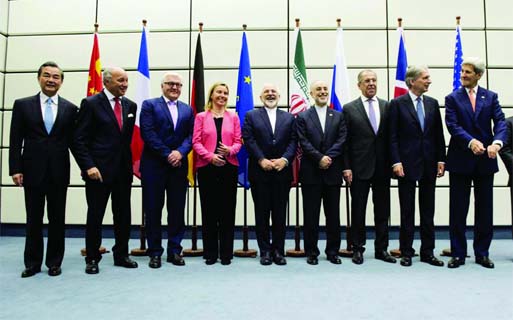
The Washington Post, VIENNA :A historic agreement Tuesday to limit Iran’s nuclear program in exchange for sanctions relief will ensure Iran will have no possibility to achieve rapid nuclear weapons “breakout” capabilities for at least the next decade, U.S. leaders said.”We have stopped the spread of nuclear weapons in this region,” said President Obama as he listed some of the pillars of the deal including international inspections, reductions in Iran’s centrifuges used to make nuclear fuel and a sharp cut in Iran’s stockpile of nuclear material.”We put sanctions in place to get a diplomatic solution, and that is what we have done. This deal offers an opportunity to move in a new direction pointing to a potentially tough review ahead in Congress.Secretary of State John F. Kerry described the deal as moving beyond a political framework reached three months ago, and he said it met all U.S. requirements for blocking pathways to weapons development with strict inspections and provisions to snap sanctions back into place if Iran violates the rules. A senior Iranian official, speaking to Western reporters on condition of anonymity, said the agreement would be submitted to the U.N. Security Council within a week to 10 days, and then be incorporated into a new council resolution that eventually will lift sanctions that have crippled Iran’s economy. In Israel, the accord was viewed with widespread worry after intense international lobbying efforts against the talks.Israeli Prime Minister Benjamin Netanyahu described the deal as a “mistake of historic proportions” that would replenish Iran’s treasuries and allow it to maintain the components of a potential nuclear weapon. “Iran is going to receive a sure path to nuclear weapons. Many of the restrictions that were supposed to prevent it from getting there will be lifted,” Netanyahu said during a meeting with the Dutch foreign minister in Jerusalem. Kerry said the deal has also raised the possibility that it could provide a platform for expanded diplomatic overtures between Iran and the United States – which cut ties in 1980 during the Iranian hostage crisis. “Confidence is never built overnight. It has to be built over time,” said Kerry. The agreement will not take effect until Iran is certified to have met its terms – something Iran says will happen in a matter of weeks but that Western diplomats have said could take at least until the end of the year.The deal culminated 17 straight days of sometimes-rocky negotiations that often stretched through the night and occasionally were marked by shouting that wafted beyond the closed doors of the negotiating rooms. Beaming diplomats gathered at midmorning in the Austria Center in downtown Vienna, where the official announcement was scheduled later Tuesday. Iran’s foreign minister, Mohammad Javad Zarif described negotiations as a “win-win solution.” “What we could accomplish is an important achievement for all of us,” he said. “Now we are starting a new chapter of hope.” In Tehran, Iranian President Hassan Rouhani posted a message on Twitter saying the deal shows that “constructive engagement works. With this unnecessary crisis resolved, new horizons emerge with focus on shared challenges.” A senior Obama administration official said that, until Iranian compliance is verified, an 18-month old interim agreement restricting Iran’s activities, and sanctions, will remain in place. The overall scope seeks to put Iran at least one year away from nuclear weapons “breakout” levels – the time it would take to produce enough fissile material for one nuclear bomb – if Tehran decided to shun the accord and strike out on its own.Achievement of an agreement ends one phase of more than 18 months of negotiations between Iran and world powers, including the United States, Britain, France, Germany, Russia, China and the European Union. But it begins another, potentially more critical phase, as the administration tries to sell the deal to a skeptical Congress. Lawmakers have 60 days to review the agreement, which totals nearly 100 pages with a principal document and five technical annexes. Most congressional criticism has come over several issues. They include: whether embargoes under U.N. sanctions would continue on the sale to Iran of conventional weapons and ballistic missile technology and such other verifications measures.

